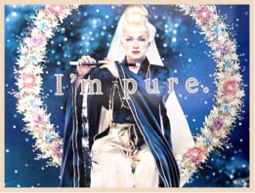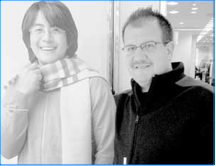
Todd Jay Leonard, Blog


A reader sent me an e-mail asking about the current situation regarding entertainers and sports celebrities from the United States making extra cash by coming over here to do Japanese commercials. In the past, this was a very lucrative part-time job for big-name American stars.
As featured in the movie, “Lost in Translation,” a fading film star (played by Bill Murray) was in Japan to make some quick cash by hawking whiskey in print and television ads. He was beyond bored with the whole idea. Soon he became frustrated with the subtleties of Japanese culture and with doing business in Japan, of which he had absolutely no clue.
In the past, this was certainly a very representative scenario of how U.S. celebrities would fly in for a few days, say a couple of words in English for a commercial, then fly home with a suitcase bulging with cash — millions of dollars in some cases.
These stars, however, had iron-clad contracts that restricted the use of the advertisement to the Japanese market only. The ads or commercials couldn’t be used outside of Japan.
The reason for this was largely cultural, to a certain degree. In the United States, traditionally stars who would do commercials were labeled “has-beens.” With their careers waning and their popularity at an all-time low, they would be forced to take what they could get in the form of work, so commercials were sometimes their only option.
I remember seeing a celebrity who was formerly quite famous selling windows on late-night TV and thinking, “Poor guy. He just doesn’t have it anymore.” It was an attitude of pity.
In Japan, the opposite is true. The hottest stars and entertainers are regularly featured in the trendiest commercials for ultimate exposure to the public. I suppose the U.S. equivalent would be for an American agent to parade an actor on the talk-show circuit to promote a new project or movie.
On recent trips home, I’ve noticed a big change in this area. More and more “A-list” stars are gladly accepting gigs on commercials and in print ads. Perhaps they have realized that instead of signaling their demise from show business, a well-placed commercial could actually be a catalyst to bigger and better things in the industry. That certainly is the case in Japan.
Sadly for U.S. stars, though, the trend in Japan recently is not to feature American celebrities as much as other Asian entertainers. There has been a real upheaval in the market here, and people are crazy for Korean, Hong Kong, Chinese and Thai entertainers.
The current biggest star is a Korean man called “Yon-sama” (his character’s name) who has taken the country by storm. He was featured in a public television program imported from Korea a couple of years ago called “Winter Sonata.”
This program was an unexpected and wildly popular hit with middle-aged to elderly women, keeping them glued to their TV sets every Sunday night. The result was a “Korea boom” that was unprecedented in the history of Korean-Japanese relations.
Historically, relations between Japan and Korea have been rocky at best. Even the 2002 World Cup that was shared between these two neighboring nations as a way to bridge diplomatic relations did nothing in comparison to what Bae Yong Jun (Yon-sama’s real name) did in his romantic portrayal of a love- struck boy involved in a love triangle.
Interest in this imported Korean soap opera was so great that tourism to Korea exploded — fans rushed to Korea to see the house and scenes featured in the drama. Travel agencies designed tours to cater to these women who couldn’t get enough of “Yon-sama.”
In fact, middle-aged women wept, screamed and even fainted when the actor came to Japan on a promotional tour. There were so many 50-something women fans at the Tokyo airport to greet him that security guards had to usher him out a back door for fear that some of these women might get trampled if the riotous mob pushed forward for a closer look. Trust me ... one does not want to be involved in a stampede of middle-aged Japanese women delirious with a longing desire for a fantasy romance with a television character.
I have to admit, I was a bit curious about the hoopla surrounding this Korean-phenomenon called Yon-sama, so I took a trip to Korea to see for myself. I can report that he is every bit as big there as he is in Japan. Even the duty-free emporium had an entire store devoted to goods with his likeness emblazoned on everything from dainty socks to chunky ashtrays.
He is a business unto himself, and anyone and everyone is jumping on his coattails in hopes of getting a piece of the pie. Street vendors selling his likeness on trinkets and knickknacks are making a bundle with the Japanese tourists who grab up everything related to him.
So, instead of U.S. movie stars gracing all the print ads in magazines and being featured in all the prime-time TV commercials, the current trend in Japan is everything Korean. And the Japanese can’t get enough.
This one soap-opera, “Winter Sonata,” and the actor, Bae Yong Jun, has done more toward normalizing diplomatic relations between Korea and Japan than all of the politicians, diplomats and sports exchanges combined. Now, that is impressive.
By TODD JAY LEONARD
Columnist
U.S. star power gives way to Korean heartthrob
Monday, June 5, 2006








